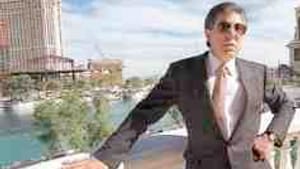Stay in the Loop
BSR publishes on a weekly schedule, with an email newsletter every Wednesday and Thursday morning. There’s no paywall, and subscribing is always free.
Up against a casino mogul (from one who lived to tell the tale)
Fighting Steve Wynn: A civics lesson

Philadelphians were shocked recently when the Las Vegas casino resort/real estate developer Steve Wynn abruptly withdrew from the deal to transform the Foxwoods casino in South Philadelphia into "the cutest little casino you ever saw." Even the Foxwoods attorney, Fred Jacoby, confessed that he "never saw it coming."
Well, I saw it coming.
Wynn has a history of running from Philadelphia when things get hot under the collar. In June 1998, he bought the Maxfield Parrish mural, Dream Garden, a 15-by-49 foot, 100,000-piece color glass mosaic in Philadelphia's Curtis Center. When Wynn announced that he was transporting the mural to one of his casinos in Las Vegas, Philadelphians had to face the fact that a work of art they'd long taken for granted would soon be sent packing.
The first news reports of the Parrish sale had a freezing effect. Many people then began referring to Dream Garden in the past tense, as something lost to the city forever— this, despite the fact that the work wasn't nearly as famous as many of the masterworks in the Art Museum. "How did this happen?" Philadelphians wondered, and "Where were we when the deal went through?"
But now that someone famous perceived real value in Dream Garden, the work became an object of veneration. Philadelphians flocked to the mural, which had been an integral part of the Curtis Building lobby since 1916, for one last glance. The notion of fighting Wynn didn't arise until some weeks later.
Neglected masterpiece
In 1998, I think it's safe to say, Wynn just didn't think Philadelphians cared if the mural was shipped to the lobby of a casino thousands of miles away. At that time Wynn even remarked that Dream Garden would receive better exposure in Las Vegas then it was getting in the Curtis Center's sleepy lobby. As someone who worked in the Curtis Building for a number of years, I can attest that most of the people visiting the lobby then were security guards looking for a quiet place to snooze or arthritic passersby with tired feet.
So Wynn didn't expect Philadelphians to fight back. But then something happened.
In a café on the other side of town, a friend and I formed the Arts Defense League (later renamed the Coalition for Philadelphia Art) to fight the hijacking of Dream Garden to Las Vegas. Our organization initiated protests and gathered petitions everyday at noon in front of the Curtis Building.
At the time we feared that we might come across as a couple of washed-out '60s protesters with hand-lettered signs. When media outlets as diverse as the Inquirer, the Daily News, national NPR, several TV stations and yes, even People Magazine came calling, nobody was as shocked as we were. In retrospect, we underestimated the media's insatiable hunger for drama of the David-vs.-Goliath variety.
Overnight, our membership ranks swelled as people realized that perhaps something could be done to reverse the sale.
With our daily street demonstrations in high gear and our petition signatures growing by the hundreds, Steve Wynn suddenly announced that he was backing out of the deal.
What's a Philadelphian?
In light of these reversals, I can't help wondering whether Wynn's anthropological studies as a Penn undergrad in the '60s gave him false notions about what "constitutes" a Philadelphian. (Would those anthropological labels be "weak" and "susceptible to outside takeovers"?) Whatever— I conclude from these two events that Wynn is someone who, for all his perceived wealth and power, just can't hack long-term controversy.
Both Mayor Nutter and other city officials insist that Wynn's withdraw had nothing to do with the city, but I wonder. In 1998 Wynn was pretty much demonized in the press. Beyond City Hall he was portrayed as someone who only wanted to gobble up every piece of art to furnish his plastic palaces on the Las Vegas strip. When your primary asset is illusion, bad publicity can sometimes be worse than a sour business deal.
In the recent Foxwoods case, I think Wynn miscalculated. Had he stayed and fought a little longer, he could have made the deal work for everyone involved. He could have given Philadelphians their best hope of a gambling casino that might have been palatable even to gambling foes.
But for ordinary Philadelphians— marinated in 300 years of Quaker timidity— the lesson of these two encounters with Steve Wynn is this:
Don't be afraid to assert yourself. You possess more power than you think. When you're up against the Wicked Witch of the West, sometimes all you need to win the fight is a pail of water, and a little spine.♦
To read responses, click here.
Well, I saw it coming.
Wynn has a history of running from Philadelphia when things get hot under the collar. In June 1998, he bought the Maxfield Parrish mural, Dream Garden, a 15-by-49 foot, 100,000-piece color glass mosaic in Philadelphia's Curtis Center. When Wynn announced that he was transporting the mural to one of his casinos in Las Vegas, Philadelphians had to face the fact that a work of art they'd long taken for granted would soon be sent packing.
The first news reports of the Parrish sale had a freezing effect. Many people then began referring to Dream Garden in the past tense, as something lost to the city forever— this, despite the fact that the work wasn't nearly as famous as many of the masterworks in the Art Museum. "How did this happen?" Philadelphians wondered, and "Where were we when the deal went through?"
But now that someone famous perceived real value in Dream Garden, the work became an object of veneration. Philadelphians flocked to the mural, which had been an integral part of the Curtis Building lobby since 1916, for one last glance. The notion of fighting Wynn didn't arise until some weeks later.
Neglected masterpiece
In 1998, I think it's safe to say, Wynn just didn't think Philadelphians cared if the mural was shipped to the lobby of a casino thousands of miles away. At that time Wynn even remarked that Dream Garden would receive better exposure in Las Vegas then it was getting in the Curtis Center's sleepy lobby. As someone who worked in the Curtis Building for a number of years, I can attest that most of the people visiting the lobby then were security guards looking for a quiet place to snooze or arthritic passersby with tired feet.
So Wynn didn't expect Philadelphians to fight back. But then something happened.
In a café on the other side of town, a friend and I formed the Arts Defense League (later renamed the Coalition for Philadelphia Art) to fight the hijacking of Dream Garden to Las Vegas. Our organization initiated protests and gathered petitions everyday at noon in front of the Curtis Building.
At the time we feared that we might come across as a couple of washed-out '60s protesters with hand-lettered signs. When media outlets as diverse as the Inquirer, the Daily News, national NPR, several TV stations and yes, even People Magazine came calling, nobody was as shocked as we were. In retrospect, we underestimated the media's insatiable hunger for drama of the David-vs.-Goliath variety.
Overnight, our membership ranks swelled as people realized that perhaps something could be done to reverse the sale.
With our daily street demonstrations in high gear and our petition signatures growing by the hundreds, Steve Wynn suddenly announced that he was backing out of the deal.
What's a Philadelphian?
In light of these reversals, I can't help wondering whether Wynn's anthropological studies as a Penn undergrad in the '60s gave him false notions about what "constitutes" a Philadelphian. (Would those anthropological labels be "weak" and "susceptible to outside takeovers"?) Whatever— I conclude from these two events that Wynn is someone who, for all his perceived wealth and power, just can't hack long-term controversy.
Both Mayor Nutter and other city officials insist that Wynn's withdraw had nothing to do with the city, but I wonder. In 1998 Wynn was pretty much demonized in the press. Beyond City Hall he was portrayed as someone who only wanted to gobble up every piece of art to furnish his plastic palaces on the Las Vegas strip. When your primary asset is illusion, bad publicity can sometimes be worse than a sour business deal.
In the recent Foxwoods case, I think Wynn miscalculated. Had he stayed and fought a little longer, he could have made the deal work for everyone involved. He could have given Philadelphians their best hope of a gambling casino that might have been palatable even to gambling foes.
But for ordinary Philadelphians— marinated in 300 years of Quaker timidity— the lesson of these two encounters with Steve Wynn is this:
Don't be afraid to assert yourself. You possess more power than you think. When you're up against the Wicked Witch of the West, sometimes all you need to win the fight is a pail of water, and a little spine.♦
To read responses, click here.
Sign up for our newsletter
All of the week's new articles, all in one place. Sign up for the free weekly BSR newsletters, and don't miss a conversation.

 Thom Nickels
Thom Nickels